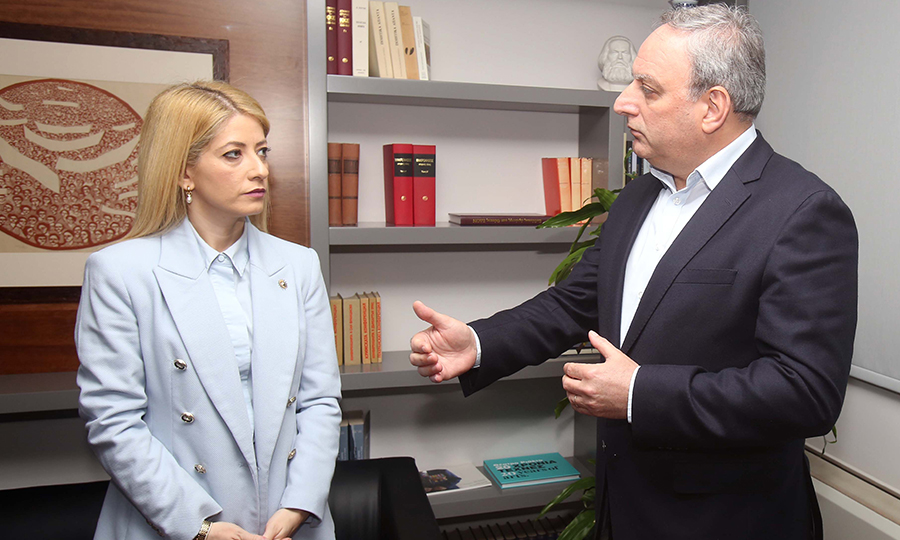

Marina Economides
June 9 is a night when all election battle scenarios, based on the polls, are possible. It is quite likely that there will be a close contest between the Democratic Rally and AKEL for the lead, but at the same time, there could be surprises that threaten even the second position. This battle will not only count their percentages but will also determine the future of the two political leaders, Anita Demetriou and Stefanos Stefanou, within the party landscape. Three factors will largely determine the outcome:
1. The concentration of the two parties – the size of abstention and its origin
2. The percentage that ELAM will receive
3. The Turkish Cypriot vote
In DISY, the main objective is to rally the party, ensuring first place and preventing further introspection. For this reason, the right-left dilemma, combining the two extremes, has already begun. DISY has highlighted AKEL's rigidities and dogmatism, while also reminding of the Christofias administration with "they ruined our economy". For a decade, the narrative of Christofias' "destructive" rule and the fear of its return has been used with relative success. The question is whether such a narrative has any relevance in today's society, where challenges differ significantly from those of the past decade. It is noteworthy that former Foreign Minister Ioannis Kasoulides was also used to critique AKEL and the left. This move may rally support but could backfire, considering that Kasoulides, who along with other top-ranking members of DISY, supported being overtaken in the 2023 presidential elections, without concern for the left's advance.
Absence from pride
Concerns about leaks to ELAM have already mobilised Pindarou to present the narrative of the two extremes, a narrative used—and adopted—from Greece. Indeed, ELAM and AKEL had common positions on the economy, but like DISY and ELAM, there are many similarities, aside from the movement of its executives. It is no coincidence that Anita Demetriou's stance on same-sex marriage, when she said society is not ready, aligns with this. It is also not accidental that DISY, except for Christiana Xenophontos, was completely absent from Gay Pride. This move was strongly criticised by Accept on Sunday.
Establishment and debacle
For Anita Demetriou, several scenarios are on the table for the outcome of June 9. If she retains the lead and achieves a percentage of 27%, she establishes herself on the political scene, dispels doubts, and looks confidently towards 2028. A figure between 25-27% is manageable, as she can use the previous judgement to justify the result. Her steps will be crucial until the 2026 parliamentary elections, where a poor result could lead to her being challenged by executives from the previous guard, who are already displeased with her management. A percentage as low as 22% is considered a debacle, potentially prompting premature challenges from these executives. A significant challenge for her is rallying support, as it is clear that she lacks strong and trusted allies.

Internal conflicts
The bad scenario is widely rumoured, not just by Anita Demetriou’s internal party opponents, but by Pindarou herself. This was evident when the president of DISY spoke of a "merciless war" and suggested that some people want the party to fail. The same rhetoric was used by Nikos Tornaritis, candidate for mayor of Nicosia, when he said in an interview that some want him to lose to undermine Anita. For many, this is an attempt to manage potential defeat, but for others, it indicates deep internal conflicts just before the major battle. Whether this will help or worsen the situation remains to be seen.
For AKEL, the Battle of June 9 has high stakes. European elections have never been the left's strong suit, partly due to a history of Euroscepticism that hindered party unity. Unlike DISY, AKEL aims to keep a low profile in this electoral battle and avoid intense confrontations. They believe a negative agenda backfires on the party and want to avoid rallying the right-wing majority vote against them.
The question for AKEL is whether a policy of full moderation and low visibility can help rally support and secure first place. Stefanos Stefanou avoids talking about winning, focusing instead on achieving a good result and retaining two seats. This approach, however, suggests a lack of clear political narrative and stakes to rally supporters. The party's attempt to forge local government partnerships has seen few successes, with most of their candidates struggling against DISY.
Strategic goals
Stefanos Stefanou’s aim for June 9 is to secure a foundation for first place in the 2026 parliamentary elections and then a clear victory in the 2028 presidential elections. A first-place result establishes him politically, enabling legislative openings and potential collaborations in the 2028 presidential race. A second-place finish, however, would fuel internal dissent, as DISY’s divided state and the president’s image problems favour AKEL's chances. The worst-case scenario is losing the second seat, which could signal that Stefanou's changes have weakened the party's ideology, leading to internal strife from those who opposed the new direction.
The Turkish Cypriot vote
The outcome may hinge on the Turkish Cypriot vote, which saw around 6,000 participants in the last European elections. Niazi Kizilyurek's candidacy and the Jasmine movement significantly mobilised this electorate. With three Turkish Cypriot candidates this time, further mobilisation is expected. If the Turkish Cypriot vote determines the outcome, DISY will frame it as a Greek Cypriot victory, while AKEL recognises the high stakes. Excluding Niazi Kizilyurek would send a negative message to the Turkish Cypriot community and CTP, who are backing his candidacy.
[This article was translated from its Greek original]































